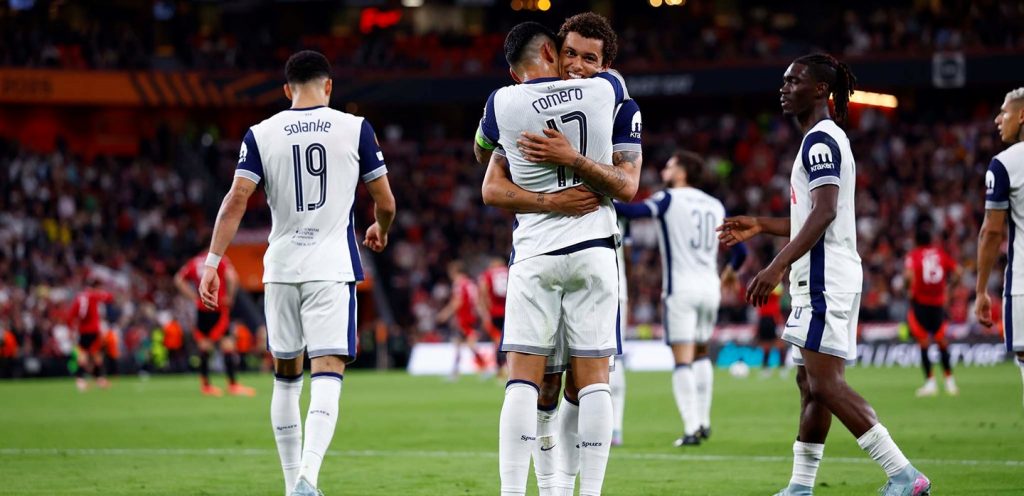Brennan Johnson’s goal was enough as Spurs won their first European trophy since 1984.

Ange Postecoglou always wins things in his second season. That’s what the Australian manager has been trying to hammer home all season. No matter how bleak things seemed. No matter how many losses piled up, or how far they fell down the table. No matter how many players get injured, or how badly Spurs wanted to be, well, Spurs. Ange always wins in his second season. On a Wednesday night in Bilbao, Ange and his Tottenham side did just that.
Here’s the thing: Tottenham never wins trophies. It’s sort of a thing. The last trophy of any type that they won was the Carling Cup in 2008. To get to their last European trophy, you have to go even further back to 1984 when Ange Postecoglou was just an 18-year-old playing for South Melbourne Football Club.
Spurs don’t just lose trophies, they lose in dramatic ways. In 2016, with their biggest title rivals being relegation favorites Leicester City, they watched on as the Foxes won the Premier League. In 2019, less than 25 seconds into the Champions League Final, the ball smacked Moussa Sissoko’s arm in the box, giving Liverpool a penalty kick. Mohamed Salah scored and Liverpool duly won 2-0.
Perhaps the most famous — certainly the most viral — moment came against Juventus in 2018. Tottenham, led by Harry Kane, Dele Alli, and Son Heung-min, put in strong performances over both legs but failed to take advantage. Juventus scored twice in quick succession late in the second leg to win and went on to reach the Champions League Final. After the second leg, defender Giorgio Chiellini dropped his famous line to describe the result: “It’s the history of Tottenham.”
Except, it isn’t the history of Tottenham anymore. For the first time in many fans’ lives, they can say that they have watched Spurs lift a trophy. Not just any trophy — a European one.
So how, exactly did the Australian manager lead his notoriously trophy-allergic side to Europa League glory? Was it his famously aggressive tactics, with a dangerously high line and relentless press?
Just the opposite, actually.
Spurs did start with a press, to be fair. Tottenham set up in a 4-2-3-1, with the focus in attack being hitting long balls over the top of Manchester United’s defense. Then, if Spurs lost possession, their attack would press United’s back three and goalkeeper Andre Onana and look to force a mistake.
It nearly worked just eleven minutes in when Brennan Johnson chased down a long ball and intercepted Harry Maguire’s pass, creating Spurs’ first chance of the game. Onana made the save, though, and the follow-up shot was blocked by Maguire.
For the most part, though, it was Manchester United in control. The Red Devils were sloppy but were also creating more chances than their London counterparts. They particularly looked better in the wide areas, with left wing-back Patrick Dorgu and right-sided attacking midfielder Amad Diallo causing the most problems for Spurs. However, with the exception of a Diallo shot flashing across the goal, neither team looked particularly threatening.
Eventually, Spurs’ long ball approach would result in a goal. Rodrigo Bentancur picked up the ball in the box and dropped it back to Pape Sarr. Sarr whipped a low cross into the box, and, with Maguire indecisive and neither Luke Shaw nor Dorgu completely aware of Brennan Johnson’s position in the box, the ball found its way in the back of the net. Johnson was credited with the goal, although it certainly was helped by a deflection via Shaw.
And then, Spurs did something Mourinho, a former Tottenham (and Manchester United) manager, would appreciate: they parked the bus and won the game.
No, really. Spurs finished the game with just 27% possession. In the second half, they finished with zero shots to Manchester United’s 11. A Spurs backline that once would’ve remained stubbornly, frustratingly high, was practically within touching distance of goalkeeper Guglielmo Vicario the entire half. Ange’s subs got progressively more defensive, with goalscorer Johnson eventually exiting for center-back Kevin Danso as Spurs switched to a back five.
The second half was perhaps best summed up by a moment from Dominic Solanke. With a half hour left, Solanke — allegedly playing striker — got the ball just outside his own box. He promptly turned and booted it upfield, with no one but Manchester United defenders waiting to collect it.
Make no mistake, though: Spurs deserved to win. For 90 minutes — 100 considering added time — they were incredibly solid defensively. Everyone did their part, from Yves Bissouma, who was winning everything in midfield, to Richarlison — often called a flop, the Brazilian striker was one of the best players on the field, putting in a strong performance and doing all the dirty work.
Or look at Brennan Johnson. The (maybe) goalscorer on the afternoon was very involved defensively, too, but didn’t hesitate to chase down long balls and covered an incredible distance. Micky van de Ven saved the day on more than one occasion, most impressively with his acrobatic clearance to deny Rasmus Højlund.
Pape Sarr put the cross in the box that was forced in for the lone goal. Destiny Udogie tirelessly won the ball and led counters. Vicario wasn’t flawless, but he made saves when he needed to — especially with his game-winning save from Luke Shaw’s header in the 97th minute. It was a hard fought, collective effort, and that’s why they won.
This game had massive implications for both sides. Heading into the final day of the Premier League, Spurs sit at 17th in the Premier League, and Manchester United at 16th. Neither side is in danger of relegation, but make no mistake: they have both had horrible years. Knowing this, both sides have made winning the Europa League a priority for weeks, especially the ever-vocal Manchester United manager Ruben Amorim.
And the winner hardly gets just a moral boost, medals, and a trophy. The Europa League winner also gets automatic qualification to the Champions League, which is a step up in quality and a significant increase in revenue. For two increasingly cash-conscious sides with high expectations and squads that desperately need to be refreshed, winning was a must. Usually, that means the lights would be too bright for Tottenham.
It wasn’t particularly pretty, but Spurs and Ange Postecoglou won’t care. They wanted to win. And, in remarkably un-Spurslike fashion, they did exactly that.
–


1 thought on “How Spurs Won the Europa League Final”